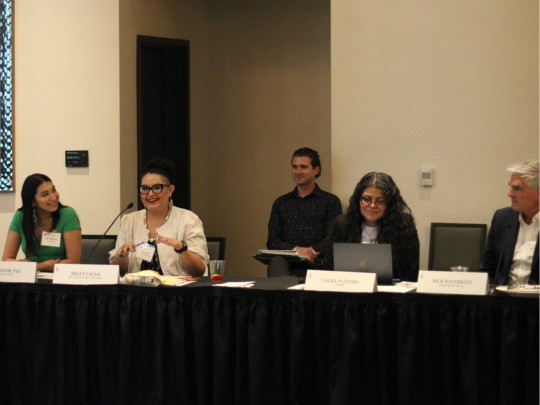PACHA Meeting Spotlights HIV Response in American Indian/Alaska Native Communities
Topics

Panelists Stephanie Paz, We R Native Youth, and Kelly Vallo, Inter Tribal Council of Arizona, (at left) discuss addressing HIV in American Indian youth during the June 2023 PACHA meeting with PACHA member Laura Platero, Northwest Indian Health Board, and Rick Haverkate, Indian Health Service, listening (at right).
(Credit: S. Mason/HIV.gov)
Much of the recent meeting of the Presidential Advisory Council on HIV/AIDS (PACHA) focused on ending the HIV epidemic in American Indian and Alaska Native (AI/AN) communities. Convening on June 28 and 29, 2023, in Phoenix, Arizona, the Council engaged with several panels and participated in site visits prior to the meeting. Many presenters were members of American Indian communities, others represented organizations serving those communities.
To open the meeting, Barnaby Lewis, (Gila River), Tribal Elder, welcomed PACHA to his community and provided a blessing. The first panel began with a presentation by PACHA member Laura Platero, JD, (Navajo), Executive Director of the Northwest Portland Area Indian Health BoardExit Disclaimer. She discussed key principles of the federal-Indian trust relationship, tribal sovereignty, and the federal responsibilities for health care. Rick Haverkate, MPH, (Sault Ste. Marie Tribe of Chippewa Indians), National HIV/HCV/STI Consultant at the Indian Health Service (IHS), informed the Council about the Indigenous HIV/AIDS Syndemic StrategyExit Disclaimer (PDF, 3.62MB), which adapts and weaves together the National HIV, STI, and Viral Hepatitis Plans using a holistic perspective that aligns with the needs of Native communities and honors the principle of indigenous sovereignty. Maria Dadgar, MBA, (Piscataway Tribe of Accokeek), Executive Director of the Inter Tribal Council of ArizonaExit Disclaimer, spoke about her organization’s work with AI/AN community members via federal contracts, grants, and cooperative agreements in three primary service areas—health, research, and environmental quality.
A panel on addressing HIV in AI/AN communities followed. Heather Myers Huentelman, PharmD, BCPS, CAPT USPHS, HIV Clinical Pharmacist at the Phoenix Indian Medical Center (PIMC), discussed how PIMC’s integration of AI/AN cultural understanding, support of native traditions, and focus on trauma-informed care in its HIV services facilitates patient engagement and retention. She also highlighted her efforts to train, mentor, and support more American Indian pharmacists and health care providers, who can one day take over her role and others. Jessica Leston, MPH, (Tsimshian), Director of the National Center for Clinical Support and Preventive Health Services at the Northwest Area Indian Health BoardExit Disclaimer, focused on the application of the Indigenous HIV/AIDS Syndemic Strategy to rising public health threats in AI/AN communities—particularly the alarming rise in syphilis and congenital syphilis cases. The Program Director for the Community Health Education and Resiliency Program at the Albuquerque Area Indian Health Board, Inc.Exit Disclaimer, Savannah Gene, MS, CHES, (Navajo), who is also the Co-creator and Administrator for the National Native HIV NetworkExit Disclaimer, spoke next. She highlighted the importance of leading with community input and understanding of cultural values, as well as building strategic partnerships and incorporating multi-generational representation when serving AI/AN communities. Concluding the session was Rydell J. Curley, HIV Health Technician in the Public Health Nursing Department at the IHS Chinle Comprehensive Health Care Facility. Mr. Curley’s remarks focused on the importance of cultural awareness in serving the AI/AN communities, opportunities to bridge traditional and Western medicine to deliver holistic care for patients, and the value of sustaining personal connections with individuals served by the clinic.
The final panel focused on addressing HIV in AI/AN youth. Panelists Stephanie Paz, MPH, (Ysleta del Sur Pueblo), Ambassador for We R Native YouthExit Disclaimer, and Kelly Vallo, (Navajo/Acoma Pueblo), Native Youth Coordinator for the Inter Tribal Council of Arizona, discussed their work in Indian Country on programming related to ending the HIV epidemic, preventing new HIV diagnoses among AI/AN youth, and providing comprehensive sex education to youth. Miguel Gomez, Director of HIV.gov, spoke with Ms. Paz and Ms. Vallo about tips they have for engaging Native youth on HIV and other health issues. Watch their conversation:
The day prior, June 27, PACHA members and federal partners in attendance visited PIMC’s HIV Center of Excellence and two community-based organizations, the Southwest CenterExit Disclaimer and Native HealthExit Disclaimer. At each site, staff shared insights on how their work intersects with and supports efforts to end the HIV epidemic and how they tailor their programs and services to engage and support key populations. PIMC representatives expressed appreciation for resources from the Minority HIV/AIDS Fund, which have helped them achieve over 90% viral suppression rates through an innovative workforce collaboration leveraging community health workers, pharmacists, and peer educators.
Following these presentations, discussions, and site visits, PACHA drafted and approved a Resolution Concerning Urgent Action Recommended for Syphilis Syndemic (PDF, 81.1KB), which recommended several specific actions to the HHS Secretary.